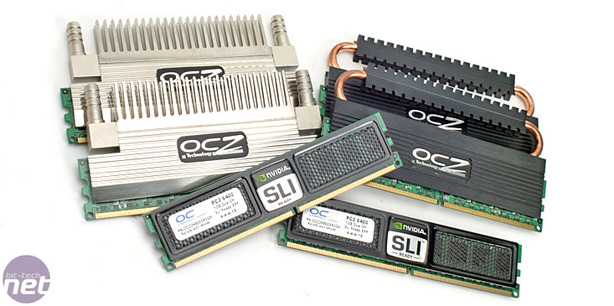
Warranty
OCZ not only offers a lifetime warranty on its modules (10 years in some parts of Europe), but it also extends this warranty to overclocking and overvolting as well. Not that you can ever really tell an overclocked module death from one that has just died from just being a bad module.Even so, OCZ really does have enthusiasts at heart when it comes to designing its products and keeping its customers happy. The EVP is very liberal as well, and means you can really throw the voltage at the DIMMs with an assurance your investment is safe in the long run.
Temperature Evaluation
To test our concerns about the heatsink capabilities we loaded the memory (and CPU) with Orthos for 10 minutes and then probed the temperature of the memory chips and heatsink in various places to test if it was actually isothermal and doing the job properly.Firstly the SLI Ready XTCs were tested and we found a decent 45/46ºC in both the positions tested. Since both sides are identical we decided to test as close as possible to a memory chip, behind a the SLI badge first and found it was a degree cooler than the "vented" area covering most of the package.
The Reaper modules were tested with one probe by the memory chips and main heatspreader body, then the next where the heatspreader meets the heatpipe. We found a 3ºC difference as it moves up the module: 40ºC versus 37ºC, with a single degree difference, 39ºC versus 40ºC between front and back. Testing the actual fin array was difficult because there was nowhere to actually poke the probe but on average the recorded temperature came out at between 33-36ºC. In all, the Reapers are pretty far from isothermal but the still manage to cool the memory better than the XTC heatspreaders.
The FlexXLCs turned out very well, with the memory chips at the front with the slightly thicker heatsink only being a single degree hotter than the rear ones. The temperature inside the watercooling barb was also 37ºC so the the heatsink seems to be working quite effectively despite our fear of the heat transmission across different parts of the package.

Value
OCZ DDR2 PC2-6400 SLI-Ready Edition: To get CAS-3 800MHz capable modules for around £85 is an absoulte bargain. In comparison, Kingston also offers a low latency 800MHz kit for just £80, but it isn't warrantied for overvoltage and overclocking like the OCZ is. £5 for absolute peace of mind is certainly worth it. The XTC heatspreaders are also slightly chunkier than the plain blue heatspreaders Kingston throws on every HyperX module as well.The Corsair Dominator CAS-3 guaranteed kits are around £200 more but TwinX CAS-4 is a lot less, however still far more expensive. Only the basic CAS-5 TwinX 2GB kit manages to undercut the OCZ, but at CAS-5 800MHz being able to overclock to CAS-3 is unlikely. In addition, the OCZ kit still looks better with the XTC heat spreaders versus the standard TwinX.
OCZ DDR2 PC2-8500 Reaper HPC Edition: For £110 these represent good value for money considering nearly all other PC2-8500 CAS-5 modules are more expensive, like the Kingston PC2-8500 CAS-5, 1066MHz for £118, and the Corsair Dominator C5 PC2-8500 for around £125.86. The Corsair is currently pre-order only however, but does also include EPP and the fancy DHX heatsinks but since the Dominator title is now saved for only the best Corsair performance memory, it should indefinitely cost more while offering a greater performance potential. Crucial Balistix PC2-8500 CAS-5 is actually slightly cheaper at £100 and at just 2.2V it should provide a bit more headroom, although it only features standard Balistix heatspreaders.
1066MHz is the new DDR2 speed standard for AMD Socket AM2+ processors, but why would you invest in this over the equally capable and cheaper SLI-Ready Edition XTCs, the 9200 FlexXLC or the superb Kingston PC2-9600s? Even though they are among the best value among ones of this type, on the wider scale there's little reason to buy them over some other offerings.
OCZ DDR2 PC2-9200 FlexXLC Edition: These can be found for a very appealing £147.58 which is fractionally more than the Reaper PC2-9200 but you do get the option of watercooling and in our opinion a marginally better heatsink. Alternatively there's the Mushkin XP2-9200 for £241 which obviously costs more but they run at a super low 5-5-4-12 timings. Team Group PC2-9600 modules are available for some £50 more and are not only apparently capable of an eye watering CAS-4 at 1200MHz but come with even crazier heatpipes.
But why would you buy any of these over the Kingston PC2-9600 CAS-5, 1200MHz for £125? It may not look as good (unless you void the warranty modding them) but they are cheaper than anything else and offer a fantastic performance.

MSI MPG Velox 100R Chassis Review
October 14 2021 | 15:04








Want to comment? Please log in.